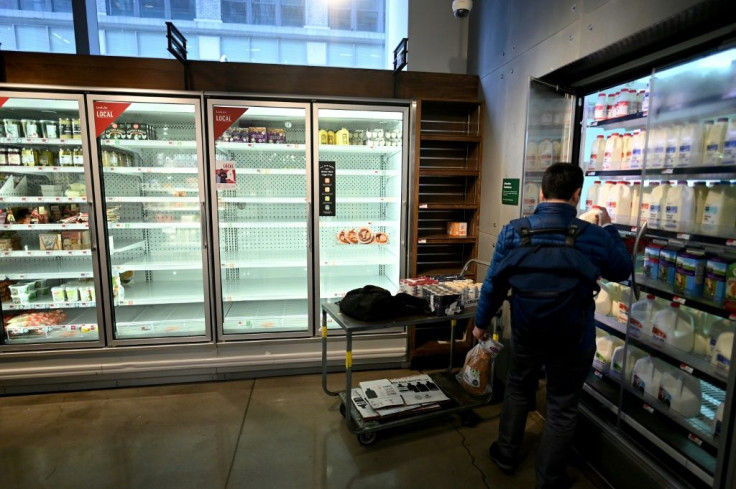Omicron Hits Grocery Shelves As Retail Stocks Fall Amid Supply Chain, Staffing Issues
KEY POINTS
- Albertsons stocks dipped by 9.75% Tuesday amid supply chain issues and staff shortage
- Residents of Baltimore, Maryland, are struggling to find basic goods in grocery stores
- Extreme weather has also been blamed for transportation-related issues in the industry
The Omicron variant of COVID-19 has resulted in empty grocery shelves amid supply chain delays and staffing shortages. Major grocers witnessed their stocks fall Tuesday as the sector struggles with supply chain-related issues and extreme weather.
Several supermarkets are experiencing supply chain delays, resulting in empty grocery shelves as the Omicron variant continues to spread across the U.S., CNBC reported. Investors are also being pressured with the expected longer period of increased costs in various aspects of the industry such as transportation and labor.
On Tuesday, Walmart, Kroger, and Albertsons stocks dipped, with the latter seeing the biggest decline at 9.75% at market close. While Walmart dropped less than 1%, Kroger stocks fell by about 3%, indicating a trend among major grocers being affected by supply chain troubles in the industry since the Omicron variant emerged.
In the San Francisco Bay Area’s Safeway store, dairy manager Samantha Webster said there are fewer pallets of grocery items arriving in warehouses. She added that there are not enough staff members working to unload the items as more employees have requested time off either due to contracting COVID-19 or having close contacts infected with the virus. Safeway is owned by Albertsons.
Empty grocery store shelves seen around Baltimorehttps://t.co/cTY3yvc0Jv pic.twitter.com/wrgqksEPI3
— FOX Baltimore (@FOXBaltimore) January 11, 2022
In Baltimore, Maryland, residents have been moving from one grocery shop to another in search of their specific food needs. Many grocery store workers in the area have been sickened by COVID-19 and shoppers are seeing a shortage of even basic goods such as dairy and meat products, The Baltimore Sun reported.
Windsor Mill resident Adriene Boone said the past week “seemed very reminiscent of the early stages of the pandemic when everyone was going into mass hoarding mode, like ‘We don’t know what this is, buy everything.’”
Shoppers witnessed the same scenario in several grocery stores across the United States. Speaking with Associated Press, shopper Benjamin Whitely said he now has to “hunt around for stuff” after he found a sparse selection of a few meats and dairy products at a Washington D.C. Safeway supermarket.
Some grocery store shelves across America are wiped clean, and they're staying empty as stores struggle to quickly restock everyday necessitieshttps://t.co/tMRq74F0TF
— CNN (@CNN) January 11, 2022
Shipping delays, shortages of truck drivers and the weather have also been blamed for the empty spots on grocery shelves. Specifically, residents in the Northeast and Midwest are struggling with severe weather, triggering higher demand for groceries and doubling the transportation challenges in delivering supplies during dangerous commuting conditions, CNN reported.
Finally, experts noted that supply problems in grocery stores may have also been affected by more people opting to cook their own food at home as the pandemic ultimately made many people change their eating habits.

© Copyright IBTimes 2024. All rights reserved.






















